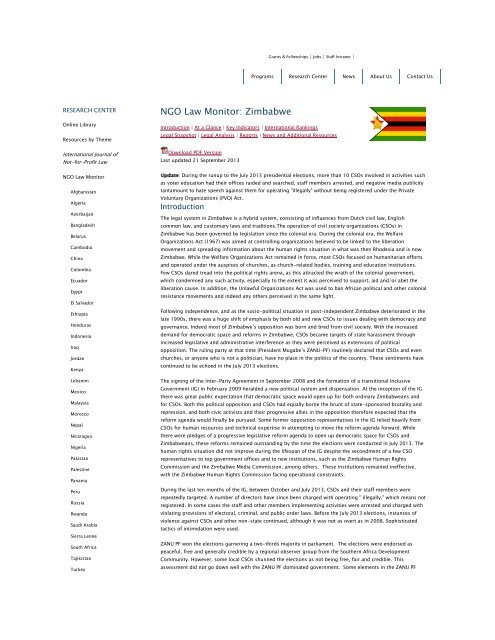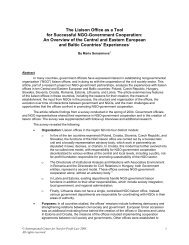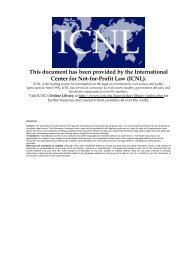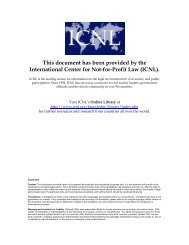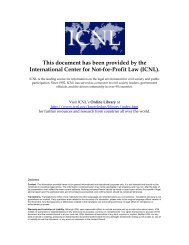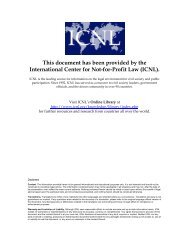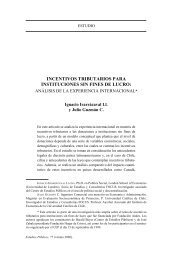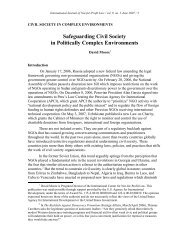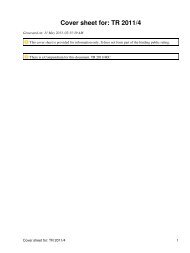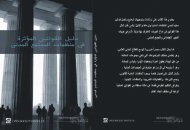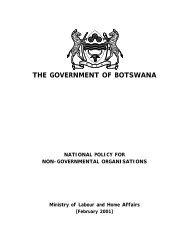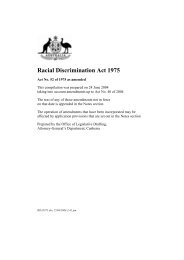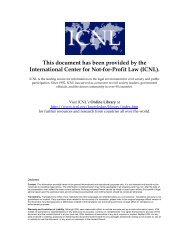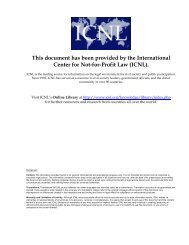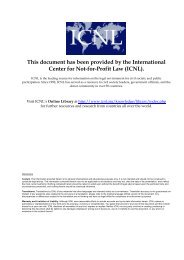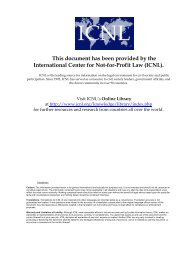Zimbabwe - NGO Law Monitor - Research Center - ICNL - The ...
Zimbabwe - NGO Law Monitor - Research Center - ICNL - The ...
Zimbabwe - NGO Law Monitor - Research Center - ICNL - The ...
You also want an ePaper? Increase the reach of your titles
YUMPU automatically turns print PDFs into web optimized ePapers that Google loves.
Grants & Fellowships | Jobs | Staff Intranet |<br />
Programs <strong>Research</strong> <strong>Center</strong> News About Us Contact Us<br />
RESEARCH CENTER<br />
Online Library<br />
Resources by <strong>The</strong>me<br />
International Journal of<br />
Not-for-Profit <strong>Law</strong><br />
<strong>NGO</strong> <strong>Law</strong> <strong>Monitor</strong><br />
Afghanistan<br />
Algeria<br />
Azerbaijan<br />
Bangladesh<br />
Belarus<br />
Cambodia<br />
China<br />
Colombia<br />
Ecuador<br />
Egypt<br />
El Salvador<br />
Ethiopia<br />
Honduras<br />
Indonesia<br />
Iraq<br />
Jordan<br />
Kenya<br />
Lebanon<br />
Mexico<br />
Malaysia<br />
Morocco<br />
Nepal<br />
Nicaragua<br />
Nigeria<br />
Pakistan<br />
Palestine<br />
Panama<br />
Peru<br />
Russia<br />
Rwanda<br />
Saudi Arabia<br />
Sierra Leone<br />
South Africa<br />
Tajikistan<br />
Turkey<br />
<strong>NGO</strong> <strong>Law</strong> <strong>Monitor</strong>: <strong>Zimbabwe</strong><br />
Introduction | At a Glance | Key Indicators | International Rankings<br />
Legal Snapshot | Legal Analysis | Reports | News and Additional Resources<br />
Download PDF Version<br />
Last updated 21 September 2013<br />
U p d a tt : e During the runup to the July 2013 presidential elections, more than 10 CSOs involved in activities such<br />
as voter education had their offices raided and searched, staff members arrested, and negative media publicity<br />
tantamount to hate speech against them for operating "illegally" without being registered under the Private<br />
Voluntary Organizations (PVO) Act.<br />
Introduction<br />
<strong>The</strong> legal system in <strong>Zimbabwe</strong> is a hybrid system, consisting of influences from Dutch civil law, English<br />
common law, and customary laws and traditions.<strong>The</strong> operation of civil society organizations (CSOs) in<br />
<strong>Zimbabwe</strong> has been governed by legislation since the colonial era. During the colonial era, the Welfare<br />
Organizations Act (1967) was aimed at controlling organizations believed to be linked to the liberation<br />
movement and spreading information about the human rights situation in what was then Rhodesia and is now<br />
<strong>Zimbabwe</strong>. While the Welfare Organizations Act remained in force, most CSOs focused on humanitarian efforts<br />
and operated under the auspices of churches, as church-related bodies, training and education institutions.<br />
Few CSOs dared tread into the political rights arena, as this attracted the wrath of the colonial government,<br />
which condemned any such activity, especially to the extent it was perceived to support, aid and/or abet the<br />
liberation cause. In addition, the Unlawful Organizations Act was used to ban African political and other colonial<br />
resistance movements and indeed any others perceived in the same light.<br />
Following independence, and as the socio-political situation in post-independent <strong>Zimbabwe</strong> deteriorated in the<br />
late 1990s, there was a huge shift of emphasis by both old and new CSOs to issues dealing with democracy and<br />
governance. Indeed most of <strong>Zimbabwe</strong>’s opposition was born and bred from civil society. With the increased<br />
demand for democratic space and reforms in <strong>Zimbabwe</strong>, CSOs became targets of state harassment through<br />
increased legislative and administrative interference as they were perceived as extensions of political<br />
opposition. <strong>The</strong> ruling party at that time (President Mugabe’s ZANU-PF) routinely declared that CSOs and even<br />
churches, or anyone who is not a politician, have no place in the politics of the country. <strong>The</strong>se sentiments have<br />
continued to be echoed in the July 2013 elections.<br />
<strong>The</strong> signing of the Inter-Party Agreement in September 2008 and the formation of a transitional Inclusive<br />
Government (IG) in February 2009 heralded a new political system and dispensation. At the inception of the IG<br />
there was great public expectation that democratic space would open up for both ordinary <strong>Zimbabwe</strong>ans and<br />
for CSOs. Both the political opposition and CSOs had equally borne the brunt of state-sponsored brutality and<br />
repression, and both civic activists and their progressive allies in the opposition therefore expected that the<br />
reform agenda would finally be pursued. Some former opposition representatives in the IG relied heavily from<br />
CSOs for human resources and technical expertise in attempting to move the reform agenda forward. While<br />
there were pledges of a progressive legislative reform agenda to open up democratic space for CSOs and<br />
<strong>Zimbabwe</strong>ans, these reforms remained outstanding by the time the elections were conducted in July 2013. <strong>The</strong><br />
human rights situation did not improve during the lifespan of the IG despite the secondment of a few CSO<br />
representatives to top government offices and to new institutions, such as the <strong>Zimbabwe</strong> Human Rights<br />
Commission and the <strong>Zimbabwe</strong> Media Commission, among others. <strong>The</strong>se institutions remained ineffective,<br />
with the <strong>Zimbabwe</strong> Human Rights Commission facing operational constraints.<br />
During the last ten months of the IG, between October and July 2013, CSOs and their staff members were<br />
repeatedly targeted. A number of directors have since been charged with operating " illegally," which means not<br />
registered. In some cases the staff and other members implementing activities were arrested and charged with<br />
violating provisions of electoral, criminal, and public order laws. Before the July 2013 elections, instances of<br />
violence against CSOs and other non-state continued, although it was not as overt as in 2008. Sophisticated<br />
tactics of intimidation were used.<br />
ZANU PF won the elections garnering a two-thirds majority in parliament. <strong>The</strong> elections were endorsed as<br />
peaceful, free and generally credible by a regional observer group from the Southern Africa Development<br />
Community. However, some local CSOs shunned the elections as not being free, fair and credible. This<br />
assessment did not go down well with the ZANU PF dominated government. Some elements in the ZANU PF
government remain bent on introducing more controlling regulation of CSOs, which they view as pursuing a<br />
regime change agenda and being backed by western countries.<br />
Back to Top<br />
At a Glance<br />
P rii v att e V oll u ntt a r y O r g a nii z attii o n s,, T r nd u stt Uniincorporatted<br />
s,, an<br />
O rr g aa n i i z aa tt i i o n aa l l FF o rr m ss<br />
A s s o c i i a tt i i o n s (( ““ U n i i v e rr s i i tt a s ”” ))<br />
For PVOs: <strong>The</strong> Registrar and the PVO Board, a body made up of representatives<br />
R e g ii s tt rr a tt ii o n B o d y from 6 ministries and 3 PVO representatives.<br />
For Trusts: <strong>The</strong> Registrar of Deeds.<br />
B arrrrii err s tt o E nttrr y<br />
Mandatory registration under the PVO Act, with penalties (fines and<br />
imprisonment) for carrying out activities or seeking financial assistance as an<br />
unregistered group.<br />
Complex registration procedures for PVOs, including requirement to publish<br />
notice in local paper, calling for persons to lodge objections with Registrar.<br />
No fixed time period for government review of PVO registration applications.<br />
Vague grounds for denial of PVO registration, including where the applicant<br />
“appears unable to abide by the objectives” stated in its application.<br />
Foreign organizations required to conclude memorandum of understanding<br />
with Government.<br />
Ministry authority to interfere in internal affairs, through suspension of all or<br />
any of the members of the PVO’s executive committee where “it is necessary or<br />
desirable to do so in the public interest.”<br />
Ministry authority to inspect “any aspect of the affairs or activities” of any PVO.<br />
Severe sanctions available, including fines and imprisonment, against PVO for<br />
B arrrrii err s tt o A cttii viittii e s<br />
failing to abide by provisions of PVO Act.<br />
Establishment of GO<strong>NGO</strong>s.<br />
<strong>NGO</strong>S are forced to sign Memoranda of Understanding with the local<br />
government for fees up to $1,000 with bans imposed on <strong>NGO</strong>s that do not<br />
sign.<br />
B arrrrii err s tt o S p e e c h<br />
a n d / o r A d v o c a c y<br />
B arrrrii err s tt o<br />
IIntternattiionall Conttactt<br />
Prohibition against insulting the office or person of the President, uttering<br />
words which are likely to undermine police authority, or communicating<br />
falsehoods prejudicial to the state (Criminal <strong>Law</strong> Codification and Reform Act).<br />
No legal barriers. In practice, however, immigration authorities have denied<br />
entry to foreigners, or confiscated passports from CSO representatives.<br />
Foreign funding for conducting voter education prohibited.<br />
B arrrrii err s tt o R e s o urr c e s Hostile environment created by government accusations against PVOs that<br />
receive foreign funding.<br />
Police interpret “notification” to mean "submit an application," even when<br />
B arrrrii err s tt o A s s e m bll y<br />
organizers are not required to do so.<br />
Back to Top<br />
Key Indicators<br />
P o p ull attii o n 12,973,808<br />
C a p i i tt a l l<br />
Harare<br />
T y p e o ff G o v e rr n m e n tt Parliamentary Democracy<br />
Male: 46.36 years<br />
Liiff e E x p e ctt a n c y att Bii rtt h<br />
Female: 45.16 years<br />
Liitt e r a c y R att e<br />
R e ll ii g ii o u s G rr o u p s<br />
Male: 94.2%<br />
Female: 87.2%<br />
Syncretic (part Christian, part indigenous beliefs): 50%; Christian: 25%;<br />
indigenous beliefs: 24%; Muslim and other: 1%
Ett h nii c G r o u p s<br />
African: 98% (Shona 82%, Ndebele 14%, other 2%); mixed and Asian: 1%; white:<br />
less than 1%<br />
G D P p e rr cc a p i i tt a $428 (2008 est.)<br />
Source: <strong>The</strong> World Factbook. Washington, DC: Central Intelligence Agency, 2009.<br />
Back to Top<br />
International Rankings<br />
R a n k ii n g B o d y<br />
R a n k<br />
R a n k ii n g S c a ll e<br />
(( b e stt – w o r stt<br />
p o s s ii b ll e ))<br />
UN Human Development Index Not ranked 1 – 182<br />
World Bank Rule of <strong>Law</strong> Index 1.4 100 – 0<br />
World Bank Voice & Accountability Index 7.7 100 – 0<br />
Transparency International 146 1 – 180<br />
Freedom House: Freedom in the World<br />
Status: Not Free<br />
Political Rights: 7<br />
Civil Liberties:6<br />
Free/Partly Free/Not<br />
Free<br />
1 – 7<br />
1 – 7<br />
Foreign Policy: Failed States Index<br />
Rank: 2<br />
Human Rights: 9.9<br />
177 – 1<br />
0-10<br />
Back to Top<br />
Legal Snapshot<br />
International and Regional Human Rights Agreements<br />
K e y II n tt e rr n a tt ii o n a ll A g rr e e m e n tt s R a tt ii ff ii c a tt ii Y o e n a rr *<br />
International Covenant on Civil and Political Rights (ICCPR) Yes 1991<br />
Optional Protocol to ICCPR (ICCPR-OP1) No --<br />
International Covenant on Economic, Social, and Cultural Rights (ICESCR) Yes 1991<br />
Optional Protocol to ICESCR (OP-ICESCR) No --<br />
International Convention on the Elimination of All Forms of Racial<br />
Discrimination (ICERD)<br />
Yes 1991<br />
Convention on the Elimination of All Forms of Discrimination Against<br />
Women (CEDAW)<br />
Yes 1991<br />
Optional Protocol to the Convention on the Elimination of Discrimination<br />
Against Women<br />
No --<br />
Convention on the Rights of the Child (CRC) Yes 1990<br />
International Convention on the Protection of the Rights of All Migrant<br />
Workers and Members of their Families (ICRMW)<br />
No --<br />
Convention on the Rights of Persons with Disabilities (CRPD) No --<br />
R e g ii o n a ll T rr e a tt ii e s<br />
African Charter on Human and Peoples' Rights Yes 1986<br />
African Charter on the Rights and Welfare of the Child Yes 1995
Treaty Establishing the African Economic Community Yes 2001<br />
Protocol to the African Charter on Human and Peoples' Rights on the Rights<br />
of Women in Africa<br />
Yes 2003<br />
Protocol to the African Charter on Human and Peoples' Rights on the<br />
Establishment of an African Court on Human and Peoples' Rights<br />
Yes 1998<br />
* Category includes ratification, accession, or succession to the treaty<br />
Constitutional Framework<br />
On May 22, 2013, a new Constitution came into force in <strong>Zimbabwe</strong> after it was published in the government<br />
Gazette. This followed a resounding “yes” vote after a referendum was conducted in the country to decide on<br />
whether to adopt this Constitution. <strong>The</strong> Constitution was a product of the reform agenda under the IG and was<br />
supposed to usher in democratic free and fair elections. This Constitution effectively replaced the Lancaster<br />
House Constitution although some of the provisions remained in force for the purpose of the elections.<br />
S e cttii o n 5 8 Frr e e d o m off a s s e m bll y a n d a s s o tiion cii at<br />
(1) Every person has the right to freedom of assembly and association, and the right not to assemble or<br />
associate with others.<br />
(2) No person may be compelled to belong to an association or to attend a meeting or gathering.<br />
5 9 Frr e e d o m tt o d e m o n sttrr att e a n d p ettiittii o n<br />
Every person has the right to demonstrate and to present petitions, but these rights must be exercised<br />
peacefully.<br />
6 0 Frr e e d o m off c o n s cii e n c e<br />
(1) Every person has the right to freedom of conscience, which includes—<br />
(a) freedom of thought, opinion, religion or belief; and<br />
(b) freedom to practise and propagate and give expression to their thought, opinion, religion or belief, whether<br />
in public or in private and whether alone or together with others.<br />
(2) No person may be compelled to take an oath that is contrary to their religion or belief or to take an oath in a<br />
manner that is contrary to their religion or belief.<br />
(3) Parents and guardians of minor children have the right to determine, in accordance with their beliefs, the<br />
moral and religious upbringing of their children, provided they do not prejudice the rights to which their<br />
children are entitled under this Constitution, including their rights to education, health, safety and welfare.<br />
(4) Any religious community may establish institutions where religious instruction may be given, even if the<br />
institution receives a subsidy or other financial assistance from the State.<br />
6 1 Frr e e d o m off e x prr e s sii o n a n d ffrr e e e d o mediia m off tt he<br />
(1) Every person has the right to freedom of expression, which includes—<br />
(a) freedom to seek, receive and communicate ideas and other information;<br />
(b) freedom of artistic expression and scientific research and creativity; and<br />
(c) academic freedom.<br />
(2) Every person is entitled to freedom of the media, which freedom includes protection of the confidentiality of<br />
journalists’ sources of information.<br />
(3) Broadcasting and other electronic media of communication have freedom of establishment, subject only to<br />
State licensing procedures that—<br />
(a) are necessary to regulate the airwaves and other forms of signal distribution; and<br />
(b) are independent of control by government or by political or commercial interests.<br />
(4) All State-owned media of communication must—<br />
(a) be free to determine independently the editorial content of their broadcasts or other communications;<br />
(b) be impartial; and<br />
(c) afford fair opportunity for the presentation of divergent views and dissenting opinions.<br />
(5) Freedom of expression and freedom of the media exclude—<br />
(a) incitement to violence;<br />
(b) advocacy of hatred or hate speech;<br />
(c) malicious injury to a person’s reputation or dignity; or<br />
(d) malicious or unwarranted breach of a person’s right to privacy.<br />
6 2 A c c e s s tt o ii nff orr m attii o n<br />
(1) Every <strong>Zimbabwe</strong>an citizen or permanent resident, including juristic persons and the <strong>Zimbabwe</strong>an media, has<br />
the right of access to any information held by the State or by any institution or agency of government at every<br />
level, in so far as the information is required in the interests of public accountability.<br />
(2) Every person, including the <strong>Zimbabwe</strong>an media, has the right of access to any information held by any<br />
person, including the State, in so far as the information is required for the exercise or protection of a right.<br />
(3) Every person has a right to the correction of information, or the deletion of untrue, erroneous or misleading
information, which is held by the State or any institution or agency of the government at any level, and which<br />
relates to that person.<br />
(4) Legislation must be enacted to give effect to this right, but may restrict access to information in the<br />
interests of defence, public security or professional confidentiality, to the extent that the restriction is fair,<br />
reasonable, necessary and justifiable in a democratic society based on openness, justice, human dignity,<br />
equality and freedom.<br />
National <strong>Law</strong>s and Regulations Affecting Sector<br />
Relevant national-level laws and regulations affecting civil society include:<br />
1.<br />
2.<br />
3.<br />
4.<br />
5.<br />
6.<br />
7.<br />
8.<br />
9.<br />
10.<br />
11.<br />
12.<br />
13.<br />
14.<br />
15.<br />
16.<br />
17.<br />
18.<br />
19.<br />
Constitution of <strong>Zimbabwe</strong> Amendment Act, 2013<br />
Private Voluntary Organizations Act [Chapter 17:05]<br />
Private Voluntary Organizations Act [Chapter 17:05] General Notice 99 of 2007 – Code of Procedure for<br />
the Registration and Operations of Non-Governmental Organizations in <strong>Zimbabwe</strong><br />
<strong>The</strong> Cooperative Societies Act [Chapter 24:05]<br />
Emergency Powers Act [Chapter 11:04]<br />
Foreign Subversive Organizations Act [Chapter 11:05]<br />
Unlawful Organizations Act [Chapter 11:13] [1]<br />
Suppression of Foreign and International Terrorism Act [Chapter 11:21] (Not yet in force)<br />
Prevention of Discrimination Act [Chapter 8:16]<br />
Labour Act [Chapter 28:04]<br />
Income Tax Act [Chapter 23:06]<br />
Indigenisation and Empowerment Act [Chapter 14:33]<br />
Indigenisation and Economic Empowerment (General) Regulations, 2010 (Statutory Instrument 21 of<br />
2010)<br />
Deeds Registries Act [Chapter 20:05] (Act No 10 of 1959)<br />
Deeds Registries Regulations, 1977 (RGN 249 of 1977)<br />
Public Order Security Act [Chapter 11:17] (Act No.1 of 2002 as amended most recently by Act 18 of 2007<br />
Immigration Act [Chapter 4:02]<br />
Immigration Regulations, 1998 (Statutory Instrument 195 of 1998)<br />
Standard Scale of Fines as substituted by the Finance Act, 2009 (No. 3 of 2009) with effect from 23rd<br />
April 2009<br />
[1] Due to be repealed by the Suppression of Foreign and International Terrorism Act [Chapter 11:21] Act 5 of<br />
2007 whose date of commencement is yet to be fixed by the President.<br />
Pending <strong>NGO</strong> Legislative / Regulatory Initiatives<br />
<strong>The</strong> Government has launched a number of regulatory initiatives, which, while ultimately not resulting in<br />
enactment, do serve to distract and/or threaten the civic sector with a more restrictive legal environment.<br />
Examples include:<br />
1. Most notably, the <strong>NGO</strong> Bill of 2004 was enacted by Parliament, but never approved by the President, and it<br />
has since lapsed. <strong>The</strong> Bill would have prohibited local <strong>NGO</strong>s engaged in issues of governance from accessing<br />
foreign funds.<br />
2. In 2009, the Ministry of Justice and Ministry of Labor issued the “Joint Memorandum re: Amendment to the<br />
PVO Act and the Deeds Registries Act” (2009). <strong>The</strong> Memo proposed that trusts, which are registered with the<br />
Deeds Registry, and fall within the definition of a PVO, be expressly included within the embrace of the PVO Act<br />
– and therefore be obliged to register as a PVO before commencing activities. This would have subjected trusts<br />
to a burdensome two-tiered registration process, and to broad control by the Registrar and PVO Board.<br />
3. On 22 March 2010, the Ministry of Health and Child Welfare reportedly announced the Government’s<br />
intention to promulgate a legal instrument to regulate all organizations that are involved in HIV/AIDs in order<br />
to effectively coordinate the national response to the epidemic. <strong>The</strong> intention was apparently to create a legally<br />
binding obligation on all such CSOs to report to or be accountable to the National Aids Council (a state entity),<br />
established pursuant to the National Aids Council Act.<br />
4. In October 2012 and June 2013, there were amendments to the Electoral Act, which sought to bar CSOs from<br />
conducting any form of voter education, without accreditation from the <strong>Zimbabwe</strong> Electoral Commission.<br />
Reproduction and distribution of any forms of the voters' roll was also criminalized.<br />
Back to Top<br />
Legal Analysis<br />
Organizational Forms
<strong>The</strong> three primary forms of civil society organization (CSO) in <strong>Zimbabwe</strong> are private voluntary organizations<br />
(PVOs), trusts and the associational form known as “universitas”. <strong>The</strong> characteristics and governing framework<br />
are described below.<br />
Unconfirmed statements by government officials put the number of CSOs operating in <strong>Zimbabwe</strong> at over<br />
20,000. <strong>The</strong> reports are unconfirmed since there is no publicly available record or database of registered legal<br />
entities. <strong>The</strong> multiple organizational forms that CSOs may and indeed do assume adds to the uncertainty.<br />
Private Voluntary Organizations<br />
A private voluntary organization (PVO) is defined as “any body or association of persons, corporate or<br />
unincorporate, or any institution, the objects of which include or are one or more of the following:<br />
1.<br />
2.<br />
3.<br />
4.<br />
5.<br />
6.<br />
7.<br />
8.<br />
the provision of all or any of the material, mental, physical or social needs of persons or families;<br />
the rendering of charity to persons or families in distress;<br />
the prevention of social distress or destitution of persons or families;<br />
the provision of assistance in, or promotion of, activities aimed at uplifting the standard of living of<br />
persons or families;<br />
the provision of funds for legal aid;<br />
the prevention of cruelty to, or the promotion of the welfare of, animals;<br />
such other objects as may be prescribed;<br />
the collection of contributions for any of the foregoing.”<br />
[Private Voluntary Organizations Act, Section 2<br />
Trusts<br />
Trusts are regulated under the Deeds Registries Act, which allows the Registrar of Deeds to register notarial<br />
deeds in donation or in trust. Trusts typically have unlimited objectives which are often intended to benefit an<br />
identifiable constituency. <strong>The</strong> trust form, however, has also been used as a way of registering organizations<br />
that have faced difficulties in registering under the PVO Act. <strong>The</strong> PVO Act excludes trusts in its definition of<br />
what constitutes a PVO. [PVO Act, Section 2(1)(h)(iii)]<br />
Universitas<br />
<strong>The</strong> use of the membership form known as “universitas” springs from the practice of recognizing an entity<br />
which has members, a constitution and activities that are entirely for the benefit of its members. It can be<br />
viewed as a common law persona; this form was recognized by the <strong>Zimbabwe</strong>an Supreme Court in <strong>Zimbabwe</strong><br />
<strong>Law</strong>yers for Human Rights & Anor v. <strong>The</strong> President of the Republic of <strong>Zimbabwe</strong> & Anor. Such an entity is<br />
excluded from registering under the PVO Act and is therefore not viewed as a PVO, but as the corporate form<br />
“universitas”.<br />
Public Benefit Status<br />
<strong>Zimbabwe</strong>an law does not provide for any special “public benefit” or tax-exempt” status that is available only to<br />
certain CSOs, based on the purposes which they pursue.<br />
According to the Income Tax <strong>Law</strong>, all CSOs are generally exempt from taxation on donations and grants<br />
received, as well as membership dues.<br />
Barriers to Entry<br />
<strong>The</strong> legal framework applicable to trusts and to “universitas” are generally permissive, but the PVO Act contains<br />
several legal barriers relating to establishment and registration.<br />
Mandatory registration<br />
<strong>The</strong> PVO Act makes registration mandatory, in that any organization that seeks to carry out work as defined<br />
under section 2 of the PVO Act must be registered. Section 6(1)(a) and (b) of the PVO Act reinforce this mandate<br />
by providing that “no private voluntary organization shall commence or continue to carry on its activities or<br />
seek financial assistance from any source unless it has been registered in respect of a particular object or<br />
objects in furtherance of which it is being conducted.” Section 6(2) and (3) of the PVO Act prohibit any<br />
individual from serving in the management or control of such an organization with the knowledge that such<br />
institution is not registered. For contravening section 6(2) on collection of funds from the public, one is subject<br />
to six months imprisonment or a fine not exceeding level five (approximately USD 200) or both; for<br />
contravening section 6(3) on managing or controlling an unregistered entity, one is subject to imprisonment<br />
not exceeding 3 months or a fine not exceeding level four (approximately USD 100) or both.<br />
Registration procedures<br />
<strong>The</strong> PVO Act provides for complex registration procedures. Once an application has been lodged, the PVO in<br />
question must publish in a local paper, at its own expense, a notice as prescribed by the PVO Act calling for<br />
persons with objections to lodge them with the Registrar of PVOs within the prescribed time limit (within 21
days of the date of publication). Once the registration papers are lodged with the Registrar of PVOs, who is<br />
ordinarily the Director of Social Welfare in the Ministry of Labor and Social Welfare, the application forms are<br />
then submitted to the Private Voluntary Organizations Board (PVOB).<br />
Time period for government review<br />
<strong>The</strong> Act is silent regarding a time period for the review process.<br />
Grounds for denial<br />
<strong>The</strong> legal grounds for denial include vague language that is subject to abuse. Specifically, the PVOB may grant<br />
or deny the application for registration, if the organization appears unable to abide by the objectives stated in<br />
its application or if the constitution and management of the organization fail to comply with the PVO Act.<br />
(emphasis added)<br />
Foreign Organizations<br />
Foreign organizations that seek to carry out work in <strong>Zimbabwe</strong>, and in particular work of a humanitarian nature<br />
or whose objectives are covered under the PVO Act, are required to register as such. Most international<br />
organizations operate as PVOs and are supposed to have a direct memorandum of understanding (MoU) or<br />
cooperation with the Government (usually at both national and local levels.) Section 3 of the General Notice<br />
99/2007 requires an international organization to file its application with the Registrar of PVOs. <strong>The</strong> application<br />
documents must include curriculum vitae and an Interpol or local police clearance certificate for the country<br />
representative, among other requirements.<br />
Barriers to Operational Activity<br />
<strong>The</strong> PVO Act also contains a number of barriers to operational activity.<br />
Interference in Internal Governance<br />
If the Minister believes that a PVO has failed to comply with its objectives or constitution, has been subject to<br />
maladministration, or has engaged in illegal activities, or that “it is necessary or desirable to do so in the public<br />
interest,” the Minister through notice in a government gazette may suspend all or any of the members of the<br />
Executive Committee of the PVO. <strong>The</strong> Minister may also amend or revoke any suspension. [PVO Act, Section 21]<br />
<strong>The</strong> suspension shall of course result in a vacancy on the Executive Committee of the PVO; if thirty days expire<br />
and the suspension is not lifted, an election will be called based on the constitution of the PVO. [PVO Act,<br />
Section 21(3)] If the entire executive committee has been suspended, a trustee (curator) may be appointed to<br />
manage the PVO for sixty days (60) or upon filling of the vacancies of the Executive Committee, whichever<br />
comes first. [PVO Act, Section 22] According to Section 7 of GN99/2007, the Registrar is the supervising<br />
authority of all PVOs in terms of the developmental impact of programs and monitoring of the organizations’<br />
corporate governance. <strong>The</strong> monitoring entails field visits by social service officers to project areas, analysis of<br />
submitted annual narrative reports and audited financial statements.<br />
Inspections<br />
<strong>The</strong> Minister is authorized to send inspectors to examine the accounts and any documents of any PVO. Once a<br />
notice has been delivered to the PVO, the PVO is expected to comply by providing all required information. <strong>The</strong><br />
documents that are effectively seized by virtue of the notice can be kept for a “reasonable period”. [PVO Act,<br />
Section 20] <strong>The</strong> reports that should be submitted to the State inspector include “any aspect of the affairs or<br />
activities of any private voluntary organization,” and the inspector has the right “to examine books, accounts<br />
and any other documents that relate to the financial affairs.” <strong>The</strong> reports must be submitted to the Registrar; in<br />
the past, however, few organizations have complied with this requirement and there has been no enforcement<br />
against PVOs per se, but rather against organizations deemed to be political (even if not PVOs).<br />
Severe sanctions<br />
<strong>The</strong> PVO Act provides for sanctions in the event of the PVO failing to abide by provisions of the Act. Offences<br />
under the PVO Act include raising funds as an unregistered organisation; being an office bearer despite having<br />
been convicted for more than 5 years for a crime involving dishonesty; and the failure to provide information as<br />
requested by an inspection officer. Available sanctions include fines, imprisonment or both, cancellation of the<br />
registration, suspension of board members and/or dismissal.<br />
Government Harassment<br />
It is not uncommon in <strong>Zimbabwe</strong> for the Government to disrupt the activity of CSOs, especially in the lead up to<br />
elections or during humanitarian crises. State interference may take the form of repeated requests for<br />
information or threatened suspension of activity. For example, in June 2008, the Government sought a blanket<br />
suspension of all PVOs engaged in humanitarian work, causing disruption of food aid and assistance to persons<br />
in need, including people living with HIV/AIDs (PLWHA) and orphans. In addition, in 2011, a provincial governor<br />
summoned field monitors to a meeting at his offices where he said that "the environment has to be cleared"<br />
before national elections can be held. Later in February 2012, when <strong>NGO</strong>s did not sign a Memorandum of<br />
Understanding with the governor or hand in copies of their trust deeds and constitutions to the governor's<br />
office, the governor suspended 29 international and local <strong>NGO</strong>s in the province. Some foreign organizations<br />
operating in <strong>Zimbabwe</strong> have had their operations suspended by the Government of <strong>Zimbabwe</strong> under the guise<br />
of rooting out organizations involved in political activity through partisan distribution of relief.
GO<strong>NGO</strong>s<br />
<strong>The</strong> establishment of government sponsored <strong>NGO</strong>s, or GO<strong>NGO</strong>s, has become prevalent since 2000. Such<br />
entities include associations of workers, students, doctors, teachers, and <strong>NGO</strong>s. <strong>The</strong>se government-sponsored<br />
<strong>NGO</strong>s have contributed to mixed messaging in respect to the operating environment of <strong>NGO</strong>s and the general<br />
human rights situation in the country.<br />
Arbitrary Requirements and Fees Imposed on <strong>NGO</strong>s<br />
Some <strong>NGO</strong>s are forced to pay exorbitant fees by local authorities in order to carry out their work. Local<br />
authorities charge <strong>NGO</strong>s amounts ranging from US$100, US$300 and up to US$1,000 per year in order to<br />
conclude a Memorandum of Understanding (MoU) with the local authorities. Where an organization refuses to<br />
pay the amount, no MoU is granted and the <strong>NGO</strong>'s activities are not allowed to proceed. This practice is alleged<br />
to have the approval of the Ministry of Local Government, Rural and Urban Development. Significantly, however,<br />
there is no legal requirement for <strong>NGO</strong>s to conclude MoUs with local authorities.<br />
Barriers to Speech / Advocacy<br />
<strong>Zimbabwe</strong>an law – and the selective application of that law – places severe restrictions on speech and advocacy<br />
activity, especially where the speech or advocacy is critical of government policy or focused on politically<br />
unpopular causes. Organizations that engage in advocacy find themselves operating within a landmine of laws<br />
which hinder free expression. <strong>The</strong> potential state response to CSO advocacy can include arrests, raids, threats<br />
and malicious prosecution. Advocacy materials, publications and opinions are all prepared and published with<br />
due regard to these laws and potential sanctions.<br />
<strong>The</strong> Public Order and Security Act (POSA) and the Criminal <strong>Law</strong> (Codification and Reform) Act (Criminal Code),<br />
for example, criminalize the insulting of the office or person of the President [Criminal Code Section 33],<br />
uttering words which are likely to undermine policing authority [Criminal Code Section 177], and<br />
communicating falsehoods prejudicial to the state [Section 31 Criminal Code]. In practice, many individuals<br />
have been arrested and prosecuted under these laws. Such laws cause individuals and organisations to censor<br />
themselves or engage in selective and thorough reviews before placing any information in the public domain.<br />
As but one example, the Government targeted Amani Trust for its involvement in high-level advocacy and its<br />
critique of the Government’s human rights record. In August 2002, Dr Francis Lovemore, medical director of<br />
Amani Trust was arrested on allegations that the Trust was guilty under POSA of “publishing or communicating<br />
false statements prejudicial to the state.” <strong>The</strong> arrest stemmed from press reports which referred to Amani<br />
Trust’s work with victims of torture and politically motivated rape. <strong>The</strong> offices of Amani Trust were raided and<br />
searched by police. Dr Lovemore was released without charge. <strong>The</strong>n, in November 2002, the Minister of Justice,<br />
Legal and Parliamentary Affairs published a list of CSOs which were alleged to be a threat to peace and security<br />
in <strong>Zimbabwe</strong>. Amani Trust appeared on the Minister’s list and was reportedly accused of working with the<br />
British Government to unseat President Robert Mugabe and destabilize the nation. That same month, the Trust<br />
closed its offices following the Government’s decision to criminalize the non-registration of <strong>NGO</strong>s under the<br />
PVO Act.<br />
For purposes of holding meetings in public spaces, the State expects CSOs to submit letters of notification of<br />
intent to hold such meetings; notification, however, has been interpreted to mean actual application. [Section<br />
24 of the Public Order and Security Act (POSA).] However this only applies to meetings to which the public is<br />
invited. Meetings by CSOs in public spaces but for their membership in which the topic of discussion is not<br />
politics are exempt from such notification. Police have continued to fail to distinguish between public<br />
gatherings and those that are exempt.<br />
Barriers to International Contact<br />
CSOs do not suffer from legal barriers restricting contact and cooperation either domestically or internationally.<br />
Many CSOs cooperate through networks, associations and unions, both within and outside the country. <strong>The</strong>re<br />
are no legal restrictions relating to Internet access, although the law does allow the State to intercept such<br />
communications (through the Interception of Communications Act).<br />
<strong>The</strong> State has in some instances used the immigration authorities at the various ports of entry to bar or restrict<br />
CSO’s foreign contacts. Notable examples are the systematic arrests and deportations of human rights<br />
defenders. Indeed, in 2005, the State toyed with the idea of introducing ‘exit visas’; this proposal has been<br />
shelved for the time being. <strong>The</strong> idea then was to give the state the power to bar certain individuals it accused of<br />
going beyond borders to spread falsehoods about the socio-political situation of the country. This was mainly<br />
targeted at CSOs and members of the then-opposition MDC.<br />
<strong>The</strong>re have been instances when targeted politicians and members of CSOs had their passports confiscated or<br />
when the State simply refused to issue new ones or renew expired ones, in order to ensure that the targeted<br />
individuals did not leave <strong>Zimbabwe</strong>.<br />
Barriers to Resources<br />
<strong>The</strong> <strong>Zimbabwe</strong> Electoral Commission Act (ZEC Act) prohibits the receipt of foreign funding for conducting voter
education. Section 16 provides that “No foreign contribution or donation for the purposes of voter education<br />
shall be made except to the Commission, which may allocate such contribution or donation to any person<br />
referred to in section 14(3) or subsection 15(1).” Other than this specific prohibition, there are<br />
no legal limitations more broadly limiting the ability of CSOs to obtain funding from any particular source. But<br />
there are a number of constraints that have arisen in practice.<br />
First, and most commonly, the Government of <strong>Zimbabwe</strong> has attacked PVOs that receive foreign funding as<br />
instruments used by the West to undermine the State. Government criticism of such PVOs has created a hostile<br />
atmosphere surrounding civil society, and especially those organizations that receive foreign funding.<br />
Second, the Government has effectively ‘stolen’ funding from CSOs – that is, funds from CSOs, located in the<br />
Reserve Bank, and allocated for the Global Fund for HIV/AIDs and Tuberculosis – and used those funds for<br />
governmental purposes.<br />
<strong>The</strong> PVO Act is silent on investment and on generating income through economic activity. In practice, CSOs<br />
generate income in a variety of ways, such as selling publications at nominal costs and through consultancies<br />
for fees. It is expected, however, that funds generated from economic activity be used for the non-profit<br />
purposes of the CSO. [PVO Act, Section 10]<br />
Back to Top<br />
Reports<br />
U N U n i i v e rr s a l l P e rr i i o d i i c R e v i i e w<br />
Not available<br />
R e p o rr tt s<br />
R e p o rr tt s o ff U N S p e c ii a ll R a p p o rr <strong>Zimbabwe</strong> tt e u rr s<br />
U S I I G (( U n i i tt e d S tt a tt e s I I n tt e rr n a tt i i o n a l l<br />
Not available<br />
G rr a n tt m a k i i n g )) C o u n tt rr yy N o tt e ss<br />
U .. S .. S tt a tt e D e p a rr tt m e n tt<br />
2010 Country Reports on Human Rights Practices: <strong>Zimbabwe</strong><br />
Advancing Freedom and Democracy Reports, 2009: <strong>Zimbabwe</strong><br />
F aiill e d Stt att e s II n d e x R e p o rtt s Foreign Policy: Failed States Index 2012<br />
IIMF Counttry Reportts<br />
IIntternattiionall Commiissiion off JJuriistts<br />
<strong>Zimbabwe</strong> and the IMF<br />
ICJ: <strong>Zimbabwe</strong><br />
Sleight of Hand: Repression of the Media and the Illusion of<br />
H u m a n R i i g h tt ss W a tt cc h R e p o rr tt<br />
Reform in <strong>Zimbabwe</strong> 2010<br />
IIntternattiionall Centter ffor Nott-ffor-<br />
P r offiitt L a w O nllii n e Lii b r a r y<br />
<strong>Zimbabwe</strong><br />
Back to Top<br />
News and Additional Resources<br />
While we aim to maintain information that is as current as possible, we realize that situations can rapidly<br />
change. If you are aware of any additional information or inaccuracies on this page, please keep us informed;<br />
write to <strong>ICNL</strong> at ngomonitor@icnl.org.<br />
General News<br />
D e m o n ss tt rr a tt o rr ss A ss ss a u l l tt e d d u all rr Day i i n off g Peace I I n Eventt e rr (September n a tt i i o n a 2013)<br />
Peaceful demonstrators from the civic group Women of <strong>Zimbabwe</strong> Arise (WOZA) were brutality assaulted on<br />
September 21. This came on a day meant to commemorate the International Day of Peace, which is celebrated<br />
throughout the world on September 21. WOZA’s demonstration, which took place outside parliament in Harare,<br />
was held under the banner of “Peace Must Deliver Freedom and Development for All,” a reminder to <strong>Zimbabwe</strong>’s<br />
elected officials that much work needs to be done to improve the country’s lack of adherence to both domestic<br />
and international legal obligations. WOZA members intended to deliver a list of demands in accordance with<br />
newly enshrined principles in <strong>Zimbabwe</strong>’s constitution, including the right to peaceful assembly, freedom of<br />
association, and free expression.<br />
U n c o m ff o rr tt a b l l e Q u e s tt i i o n s F o rr Z i Si om ciiett b a y b (September w e C i i v i 2013) i l l<br />
<strong>The</strong> next five years are going to be defining for civil society. This phase will test the capacity of civil society to<br />
self-reform and adapt to the new political climate. It will also stretch civil society beyond the boundaries of
luxury that the sector has enjoyed for some time. Only those civil society organisations, able to strategically<br />
re-align themselves to the new terrain and pursue internal reformation, that will survive this coming period.<br />
Zii m b a b w e ell e cttii o n s ' ' m u stt b e h ell y'' d (June b y 3 2013) 1 JJ ully<br />
<strong>Zimbabwe</strong>'s highest court has ruled that presidential and parliamentary elections must be held by 31 July. <strong>The</strong><br />
Constitutional Court said President Robert Mugabe should set a date "as soon as possible".<br />
G o vv e rr n m e n tt u rr g e d tt o h a rr n e ss ss C te S O parrttnerrshiips ss a n d p fforr i i devellopmentt vv a t (May 2013)<br />
A leading economist, Prosper Chitambara, has urged that there is a need to strengthen institutional structures<br />
between government, the business sector, civil society organizations and labor to enhance social dialogue and<br />
development in <strong>Zimbabwe</strong>.<br />
Zii m b a b w e ' ' b arr s' ' E U a n d U S ffrr o m o olllls b s err (March vii n g 2013) po<br />
<strong>Zimbabwe</strong> says it is not inviting Western observers to the constitutional referendum and elections due this year.<br />
Foreign Minister Simbarashe Mumbengegwi told the state-owned Herald newspaper that EU and US observers<br />
lacked objectivity. <strong>Zimbabwe</strong> is due to hold a referendum on 16 March on a constitution that will limit<br />
presidential powers.<br />
Zii m b a b w e m u stt rr e s p e ctt ff u n d a m e ntt all ffrr iin e e rr d uo nm - us<br />
p tt o c o n sttiitt uttiio n all rr eff err e n d u m (February 2013)<br />
Three United Nations Special Rapporteurs urged the Government of <strong>Zimbabwe</strong> to respect international human<br />
rights norms and standards pertaining to freedoms of association, of peaceful assembly and of expression in<br />
the run up to the constitutional referendum on 16 March and subsequent elections which may take place next<br />
July.<br />
M aa ss vv i i nn gg oo gg oo vv ee rr nn oo (February rr t 2013) hh rr ee aa t ee nn ss N G O ss<br />
Masvingo governor Titus Maluleke revived his onslaught against <strong>NGO</strong>s and threatened to eject <strong>NGO</strong>s found<br />
meddling in political issues. Maluleke caused an international storm in 2012 after he banned 29 humanitarian<br />
organisations from the province accusing them of pursuing a political agenda and refusing to register their<br />
activities with his office. This year, Maluleke allegedly ordered 43 of the <strong>NGO</strong>s to present reports of activities<br />
they carried out last year.<br />
C i i v i i l l s o c i i e tt y ‘‘ u n d e rr s i i e yg oe utt ’’ h offffiic a s ep s o iin l l Bi ulla i c we a yrr o a (February i i d 2013)<br />
Initially 40 people were detained on Monday but were later released, leaving Brilliant Goboza and Ray Ncube in<br />
detainment. <strong>Zimbabwe</strong> <strong>Law</strong>yers for Human Rights information officer, Kumbirai Mafunda, said the two were<br />
released on Wednesday after their lawyer, Charles Moyo, successfully challenged and convinced the prosecutor<br />
that they had not committed a crime, resulting in them being freed before going to court.<br />
P ollii c e rr aii d N G O offffii (January c e s 2013)<br />
Officers from the police <strong>Law</strong> and Order section raided the offices of the <strong>NGO</strong> called ZESN. According to the<br />
search warrant that police produced in Harare, the raid was to search for “any subversive material, documents,<br />
gadgets or recordings and any illegal immigrants at Number 10 Rochester Road, Belgravia, Harare”. <strong>The</strong> Cabinet<br />
ordered an investigation of the police action, especially as complaints indicated unjustified harassment of civil<br />
society organisations (CSOs) by the police. In Masvingo, suspected State agents broke into the ZESN offices and<br />
got away with T-shirts and chairs. Attempts to take away a desktop computer failed after an alert security<br />
guard tipped police bikers on patrol who got to the scene before the agents had completed ransacking the<br />
offices.<br />
L e a dii n g Rii g htt s A cttii vii stt s Arrrr e stt e d ii n Zii bwe m b (January ab 2013)<br />
According to the Voice of America <strong>Zimbabwe</strong>, the director of the <strong>Zimbabwe</strong> Human Rights Association<br />
(ZimRights), Okay Machisa, was arrested in Harare for allegedly publishing false and misleading information<br />
related to the country's voter roll. Machisa is a participant in the World Movement for Democracy and attended<br />
the Seventh Assembly in Lima, Peru in October 2012, where he co-organized a workshop on defending civil<br />
society: "How to Work in Legally Repressive Environments" In a statement denouncing Machisa's arrest, the RFK<br />
<strong>Center</strong> writes that "Political violence, human rights abuses, and intimidation against civil society activists are<br />
nothing new in the lead up to <strong>Zimbabwe</strong>an elections. During the nation's previous election cycle in 2008, when<br />
President Robert Mugabe's hold on the presidency was threatened by voters, more than 300 members from the<br />
Movement for Democratic Change (MDC) were reportedly killed, and countless more civic activists were<br />
abducted, tortured, and disappeared by the police, security forces, and associated militias."<br />
U N c o n d e m n s a tt tt a c k s o n h u m a n rr i errs i g h ahead tt s d off e ff ellecttiions e n d e (January 2013)<br />
Citing arbitrary arrests, intimidation and harassment, the United Nations human rights arm today condemned<br />
recent attacks against human rights defenders in <strong>Zimbabwe</strong> ahead of elections expected later this year. “We are<br />
concerned about the crackdown on non-governmental organisations and dissenting voices seen as critical of<br />
President Robert Mugabe’s rule and apparently politically motivated prosecutions,” Rupert Colville,<br />
spokesperson for the Office of the High Commissioner for Human Rights (OHCHR), said at a briefing in Geneva.<br />
Zii m b a b w e tt arr g ett s h u m a n rrii g htt s a (November cttii vii stt s 2012)<br />
<strong>Zimbabwe</strong> has used laws and beatings by security forces to suppress human rights activists ahead of elections
planned for next year, according to a report released Monday. A report by the Observatory for the Protection of<br />
Human Rights Defenders comes as President Robert Mugabe is pushing for constitutional amendments that will<br />
allow for elections to end his ZANU-PF party's uneasy coalition government with the nation's main opposition<br />
party. That has some worried that <strong>Zimbabwe</strong> could experience the same repression and violence seen in its<br />
2008 election, in which at least 163 people were killed and some 5,000 were tortured or beaten.<br />
G o vv e rr n m e n tt d i i ss cc u ss ss e ss ff u n d i i n g s (November "" h o ss tt i i 2012) l l e "" N G O s<br />
Mines and Mining Development Minister Obert Mpofu said the Government was seriously considering funding<br />
non-governmental organizations with interest in diamond mining. Speaking during a review meeting of the<br />
<strong>Zimbabwe</strong> Diamond Conference that was held in Victoria Falls, Minister Mpofu extended an olive branch to<br />
hostile <strong>NGO</strong>s that have been peddling falsehoods about the Chiadzwa diamonds. He said leaving them to<br />
hostile nations was harmful to national interests. “Why should a <strong>Zimbabwe</strong>an be funded and supported by a<br />
foreigner If we brought our civil society on board on all issues and prepared a budget for them, I think they<br />
would be behaving differently. One who pays the piper calls the tune,” Minister Mpofu said.<br />
C i i v i i l l s o c i i e tt y i i n s a v e C o n s n tt (November i i tt u tt i i 2012) o n c a m p a i i g n<br />
<strong>Zimbabwe</strong>'s civil society organisations have appealed to the three Global Political Agreement (GPA) principals to<br />
allow Parliament to complete the crafting of the new constitution amid insistence by President Robert Mugabe<br />
that only he will have the final say on new supreme law of the land. <strong>The</strong> director of the Crisis in <strong>Zimbabwe</strong><br />
Coalition, a grouping of more than 300 local civil society organisations, said the fact that President Mugabe in<br />
particular wanted to have a final say on the draft was a betrayal of the aspirations of <strong>Zimbabwe</strong>ans.<br />
C i i v i i l l s o c i i e tt y o rr g a n i i z a tt i i o s n s drrafftt m e consttiittuttiion e o d i (October i s c u s 2012)<br />
Over 300 delegates from different sectors of Civil Society in the country gathered in Harare for a two day<br />
leaders "indaba," which was aimed at coming up with a common position on the COPAC draft. <strong>The</strong> indaba also<br />
provides CSOs with a platform to analyze the COPAC draft constitution.<br />
E U:: Zii m b a b w e s a n cttii o n s stt a y u nttiill ell e s cttii (July o ns 2012)<br />
<strong>The</strong> European Union says it will suspend targeted sanctions on <strong>Zimbabwe</strong>'s leadership if the African nation<br />
holds credible elections. Along with other Western countries, the 27-member confederation imposed sanctions<br />
on President Robert Mugabe and his ZANU-PF party leadership in 2002, following reports of human-rights<br />
abuses. <strong>The</strong> EU ambassador to <strong>Zimbabwe</strong>, Aldo Dell’Ariccia, said ministers meeting in Brussels are encouraged<br />
by <strong>Zimbabwe</strong>'s unity government reforms in recent years.<br />
N G O ’ ’ S cc rr a cc k d o w n cc o n tt i i n u e ss a all ss commences C h i i k o m o (July ' ' ss 2012) tt rr i i a<br />
<strong>The</strong> trial of Abel Chikomo, the executive director of the <strong>Zimbabwe</strong> Human Rights <strong>NGO</strong> Forum, is scheduled to<br />
commence at the Harare Magistrates Court on Wednesday July 25, 2012. <strong>The</strong> charges against Chikomo are for<br />
running an “unregistered” organization. Chikomo was served with a summons by two police officers only<br />
identified as Sergeant Ndawana and Detective Chipwanya to stand trial at the Harare Magistrates Court.<br />
R e p orrtt s s a y E U pll a n nii n g Zii m b a b w e lliifftt s a n (July cttii 2012) o n s<br />
<strong>The</strong> European Union (EU) is facing criticism for reportedly planning to lift the targeted sanctions still in place<br />
against the Robert Mugabe regime, despite ongoing human rights concerns. <strong>The</strong> measures were put in place<br />
because of ZANU PF-led human rights violations and other actions that have plunged <strong>Zimbabwe</strong> into chaos,<br />
including vote rigging. Described as 'shopping sanctions', the restrictive measures have been placed specifically<br />
on Mugabe and key members of his regime, with the EU previously arguing that significant progress in<br />
<strong>Zimbabwe</strong> needs to be seen before the measures can be lifted. But it has been reported this week that the EU is<br />
now planning to go ahead and have the measures removed despite what human rights group and observers<br />
have called a lack of real change.<br />
S c orr e s off prr ott e stt orr s arr biittrr arriill y d ett aii in n e d Bullawayo i (July 2012)<br />
A peaceful demonstration in Bulawayo organized by Women and Men of <strong>Zimbabwe</strong> Arise (WOZA), a civic<br />
movement that defends women’s rights and freedoms in <strong>Zimbabwe</strong>, has been repressed by the authorities. <strong>The</strong><br />
clampdown led to the arrest and subsequent release of 101 of its members, including Ms. Magodonga<br />
Mahlangu.<br />
H u m a n rr i i g h tt ss N G O ss h u tt d o w n legall’’ ff o orrganiizattiion u n n i i (July n g 2012) ‘ ‘ i i l l l<br />
<strong>The</strong> executive director of the <strong>Zimbabwe</strong> Human Rights <strong>NGO</strong> Forum, Abel Chikomo, has been charged by the<br />
police for allegedly running an ‘illegal’ organization. Chairperson of the Forum, Irene Petras, said this latest<br />
move by the police was just the start of a planned clampdown against human rights defenders in <strong>Zimbabwe</strong>.<br />
Petras, a lawyer by profession, said that the Forum is operating entirely in accordance with the laws of<br />
<strong>Zimbabwe</strong>, adding that it was difficult to understand why they were continuously harassing Chikomo.<br />
Zii m b a b w e' ' s c o n sttiitt uttii o n all prr o c e s s (June drr a g 2012) s o n<br />
Constitution drafters from <strong>Zimbabwe</strong>'s rival political parties are combing through hundreds of points of<br />
contention, an exercise that is deepening the uncertainty over the country's future. Officials crafting the<br />
constiution are reviewing more than 200 issues.<br />
Vii oll attii o n s p err sii stt a s U N (May C hii 2012) eff vii siitt s
Hon. Douglas Mwonzora, the MDC Spokesperson, has said the visit by the United Nations (UN) Commissioner<br />
for Human Rights, Madam Mavi Pillay, comes at a very appropriate time and is a welcome development. Ms.<br />
Pillay arrived in <strong>Zimbabwe</strong> on a five-day official visit to assess the human rights situation. "<strong>The</strong> objective of the<br />
visit should be to assess the human rights situation in the country that involves the Commissioner interacting<br />
with all concerned. Unfortunately, her visit has been monopolised by Zanu PF and we have seen a situation<br />
where civil society and ordinary <strong>Zimbabwe</strong>ans have effectively been denied the right to interact with Madam<br />
Pillay," Hon. Mwonzora said.<br />
C i i v i i l l s o c i i e tt y g rr o u p s p rr e s e eporrtts n c (May o n ff l 2012) l i i c tt i i n g rr e<br />
Western-sponsored civil society organisations yesterday presented a damning report on alleged gross human<br />
rights violations in <strong>Zimbabwe</strong> to visiting United Nations High Commissioner for Human Rights, Ms. Navi Pillay.<br />
Prime Minister Morgan Tsvangirai endorsed the allegations in a meeting with Ms. Pillay at his Charter House<br />
offices in the afternoon.<br />
U .. N .. R i i g h tt s C o m m i i s s i i o n e rr d u o e assess i i n siittuattiion Z i i m b a b (May w e 2012) tt o<br />
<strong>The</strong> United Nations High Commissioner for Human Rights, Navi Pillay, is due in <strong>Zimbabwe</strong> for a five-day tour<br />
following an invitation by the power-sharing government. While political violence has eased over the past two<br />
years, civic groups criticize President Robert Mugabe's Zanu PF party, which controls state security, for failing<br />
to stem human right abuses. Observers say the Joint <strong>Monitor</strong>ing and Implementation Committee, set to quell<br />
tensions and respond to political clashes around the country, has not been effective.<br />
1 5 m e m b err s off o p p o siittii o n p olliittii rrrestted c all underr p arrtt Publliic y ar Orrderr and Securriitty Actt (March 2012)<br />
<strong>Zimbabwe</strong> police arrested 15 members of the MDC party. <strong>The</strong>y will be charged under the widely-condemned<br />
Public Order and Security Act (POSA). Police have over the years been accused of using POSA to target MDC<br />
politicians and civil society groups critical of President Robert Mugabe's ZANU-PF party, whose members are<br />
rarely subjected under the law. Political analyst Nkululeko Sibanda commented that the MDC arrests were an<br />
indication that free political activity remains a mirage in the country.<br />
News archive<br />
Government fails Human Rights test (October 2011)<br />
<strong>Zimbabwe</strong> Justice Minister Under Fire For Rejecting Reform Amendments (October 2011)<br />
West Using <strong>NGO</strong>s to Fan Instability, Says Minister (October 2011)<br />
Freedom House Condemns Crackdown on Peaceful WOZA Protest in <strong>Zimbabwe</strong> (September 2011)<br />
<strong>Zimbabwe</strong>'s CSO’s launch advocacy charter at UN human rights council (September 2011)<br />
Rights Group: <strong>Zimbabwe</strong> Police Arrest 13 Demonstrators (July 2011)<br />
Chiefs want <strong>NGO</strong>s back (July 2011)<br />
Police raid, invade WOZA members private meeting place (June 2011)<br />
<strong>Zimbabwe</strong> rights groups protest crackdown (May 2011)<br />
Constitution back on track as parties compromise (May 2011)<br />
<strong>Zimbabwe</strong>: <strong>The</strong> Road to Reform or Another Dead End (April 2011)<br />
<strong>Zimbabwe</strong> Human Rights Activist Charged With Failure to Register Group (April 2011)<br />
Civic groups demand end to persecution of rights defenders (April 2011)<br />
Joint statement on escalating violence, increasing instability and targeted victimization of civil society leaders,<br />
the media and ordinary citizens (February 2011)<br />
Free Activists Charged for Viewing Mideast Video (February 2011)<br />
Government to Summon <strong>NGO</strong>s (July 2010)<br />
EU demands 'concrete progress' on <strong>Zimbabwe</strong> rights (July 2010)<br />
Outreach Process <strong>Monitor</strong>s Face More Arrests and Threats (July 2010)<br />
Copac Slams <strong>NGO</strong>s (July 2010)<br />
VP Mujuru Warns <strong>NGO</strong>s (May 2010)
ZIMBABWE: EU imposes another year of sanctions (February 2010)<br />
<strong>The</strong> foregoing information was collected by the <strong>ICNL</strong> <strong>NGO</strong> <strong>Law</strong> <strong>Monitor</strong> partner in <strong>Zimbabwe</strong><br />
(tmugabe@alumni.nd.edu).<br />
Back to Top<br />
© 2012 IIntternattiionall Centter ffor Nott-ffor-Proffiitt <strong>Law</strong> ((I<strong>ICNL</strong>)) Site Map | Privacy Policy / Terms of Use


